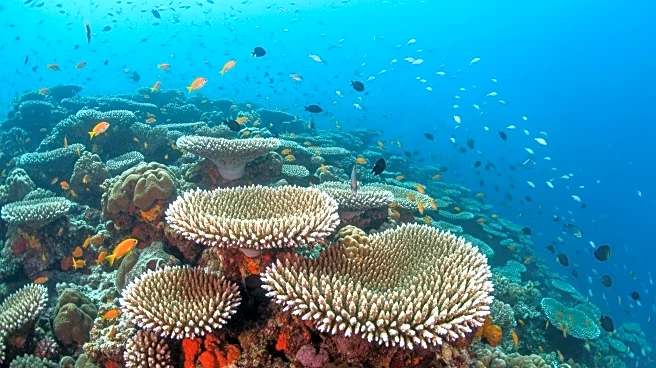What's Happening?
A team of scientists from Uruguay has discovered thriving deep-sea coral reefs off the coast of the country, revealing a rich marine biodiversity. Led by Dr. Alvar Carranza from the Universidad de la República, the expedition found that these reefs are home to numerous species recently listed as vulnerable to extinction. The coral reefs, first detected in 2010 using mapping technology, were found to be healthier, larger, and richer with life than previously anticipated. The tallest coral mound discovered was over 130 feet high, and one of the largest reef complexes spans the length of about 180 soccer fields at a depth of 984 feet. The expedition also uncovered at least 30 suspected new species, including sponges, snails, and crustaceans, along with hundreds of species never before seen in Uruguayan waters.
Why It's Important?
The discovery of thriving coral reefs in Uruguay is significant for marine conservation efforts, as it highlights the presence of vulnerable species and potential new species in the region. This finding could influence how Uruguay manages its marine resources, emphasizing the need for protective measures to preserve these ecosystems. The expedition's data may lead to the identification of more vulnerable marine ecosystems, which could impact environmental policies and conservation strategies. The thriving biodiversity also underscores the importance of continued exploration and research in deep-sea environments, which can provide insights into global marine health and biodiversity.
What's Next?
The data collected from the expedition will guide future management of Uruguay's marine resources. Scientists may conduct further research to confirm the existence of additional vulnerable marine ecosystems and explore the newly discovered species. This could lead to increased conservation efforts and policy changes to protect these ecosystems. The findings may also prompt international collaboration in marine research and conservation, as the biodiversity discovered could have implications for global marine health.
Beyond the Headlines
The discovery of thriving coral reefs in Uruguay may have broader implications for understanding the resilience of marine ecosystems in the face of climate change and human activities. The presence of vulnerable species in these reefs highlights the need for global conservation efforts to protect marine biodiversity. Additionally, the expedition's findings could contribute to scientific knowledge about deep-sea ecosystems, potentially influencing future research and exploration strategies.











